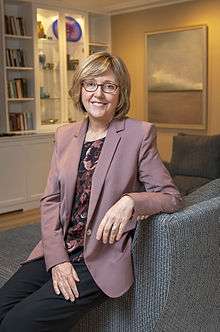Kathleen McCartney (college president)
| Kathleen McCartney | |
|---|---|
 | |
| 11th President of Smith College | |
|
Assumed office 2013 | |
| Preceded by | Carol T. Christ |
| Personal details | |
| Born |
1956 Medford, Massachusetts[1] |
| Spouse(s) | Bill Hagen[2] |
| Alma mater |
Tufts University Yale University |
| Profession | Psychologist |
Kathleen McCartney (born 1956) is the 11th president of Smith College. She was installed as Smith’s new president in ceremonies on October 19, 2013. Smith College, located in Northampton, Massachusetts, is a liberal arts college and one of the Seven Sisters colleges.[1]
Biography
McCartney was born in Medford, Massachusetts and graduated summa cum laude from Tufts University and earned her master’s and doctoral degrees in psychology from Yale University. She is in the first generation of her family to attend college. She has noted that when she studied at Tufts, male students rated female students on their physical attractiveness with numerical scores, “literally holding up signs” as the women passed by.[3]
McCartney came to Smith from the Harvard Graduate School of Education where she was dean and the Gerald S. Lesser Professor in Early Childhood Development. During her tenure at Harvard, the school introduced a three-year doctorate in educational leadership in collaboration with the Harvard Business School and Kennedy School of Government.[4] Prior teaching and research experience includes service as a tenured associate professor of psychology and family studies as well as director of the Child Study and Development Center at the University of New Hampshire.[5]
Research and academic interests
McCartney’s research has focused on early experience and development, particularly with respect to child care, early childhood education, and poverty. She has published more than 150 articles and book chapters on those topics and was the principal researcher for Child Care and Child Development, a 20-year study published in 2005 that examined whether early and extensive child care disrupted the mother-child relationship. She co-edited Experience and Development, The Blackwell Handbook of Early Childhood Development, and Best Practices in Developmental Research Methods. In 1983, McCartney and Sandra Scarr published a developmental theory of gene-environment correlation.[6]
McCartney is a fellow of the American Academy of Arts and Sciences,[7] the American Educational Research Association, the American Psychological Association, and the American Psychological Society.
Awards and honors
McCartney was the recipient in 2009 of the Distinguished Contribution Award from the Society for Research in Child Development. In 2011 The Boston Globe named her one of the 30 most innovative people in Massachusetts. In 2013, she received the Harvard College Women’s Professional Achievement Award, which honors an individual who has demonstrated exceptional leadership in her professional field.[3] In March 2015, she was elected to the Board of Directors of the American Council on Education (ACE).[8]
References
- 1 2 Mattero, Sarah N. (December 10, 2012). "Smith College names Kathleen McCartney as 11th president". Boston Globe. Retrieved 2013-10-18.
- ↑ "Kathleen McCartney, Dean of the Harvard Graduate School of Education, Named 11th President of Smith College". NEWMAC. December 10, 2012. Retrieved 2013-10-18.
- 1 2 Doody, Jennifer (May 23, 2013). "Recognizing exceptional women, Three honored at 16th Women's Leadership Awards". Harvard Gazette. Retrieved September 29, 2016.
- ↑ Auritt, Elizabeth (December 11, 2012). "Ed school dean to leave for Smith College". The Harvard Crimson. Retrieved September 18, 2016.
- ↑ "Perspectives; McCartney". Archive of Public Broadcasting (WGBH and the Library of Congress), Boston, MA and Washington, DC. New Hampshire Public Radio. 2012. Retrieved September 29, 2016.
Interview with Laura Kiernan, 29:39
- ↑ Deater-Deckard, Kirby; Mayr, Ulrich (March 1, 2005). "Cognitive change in aging: Identifying gene–environment correlation and nonshared environment mechanisms". The Journals of Gerontology Series B: Psychological Sciences and Social Sciences. 60 (Special Issue 1): 24–31. doi:10.1093/geronb/60.Special_Issue_1.24. ISSN 1079-5014. Retrieved September 18, 2016.
- ↑ "Member search". American Academy of Arts and Sciences. Retrieved September 18, 2016.
- ↑ "Board members". American Council on Education. Retrieved September 18, 2016.